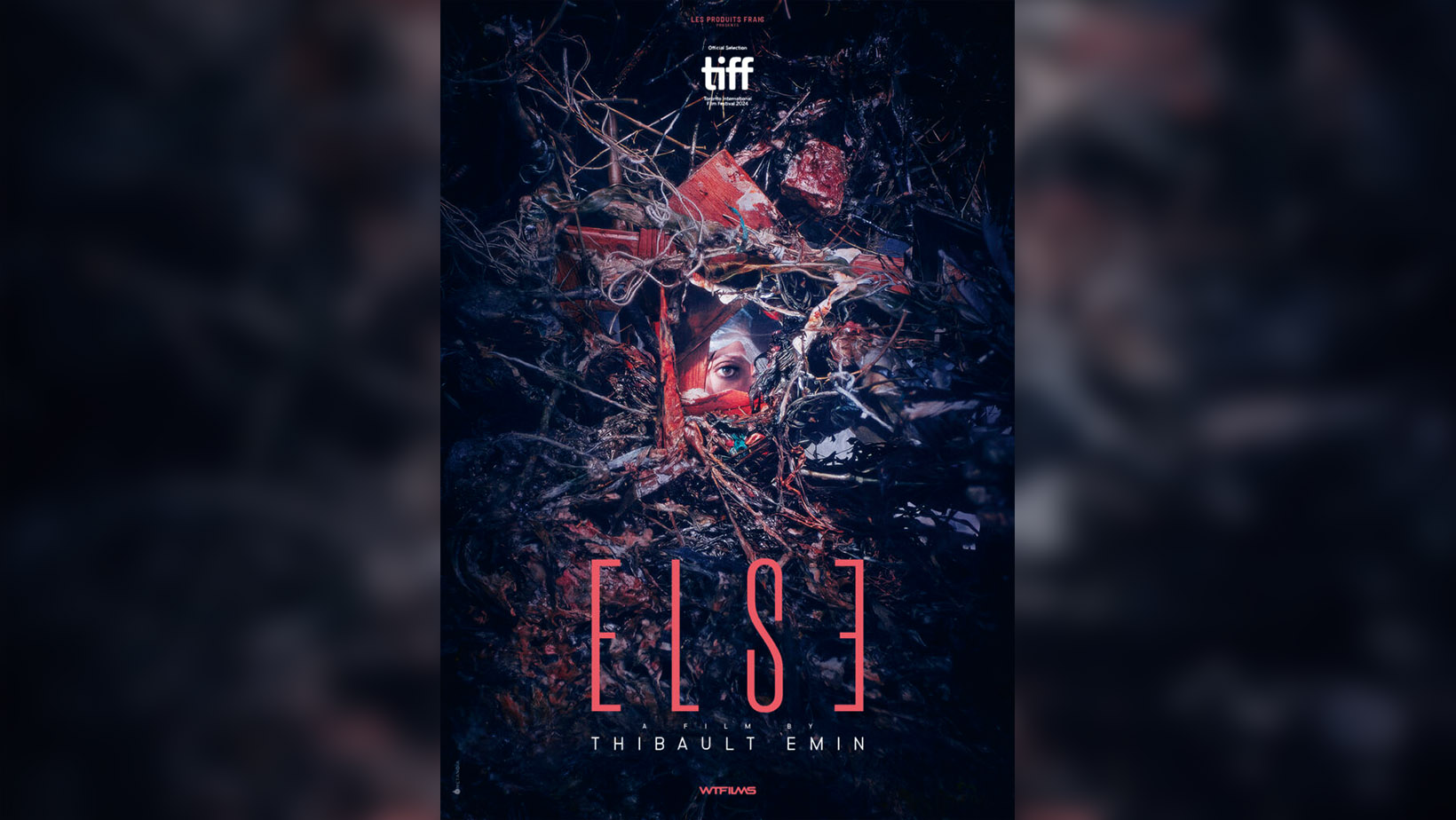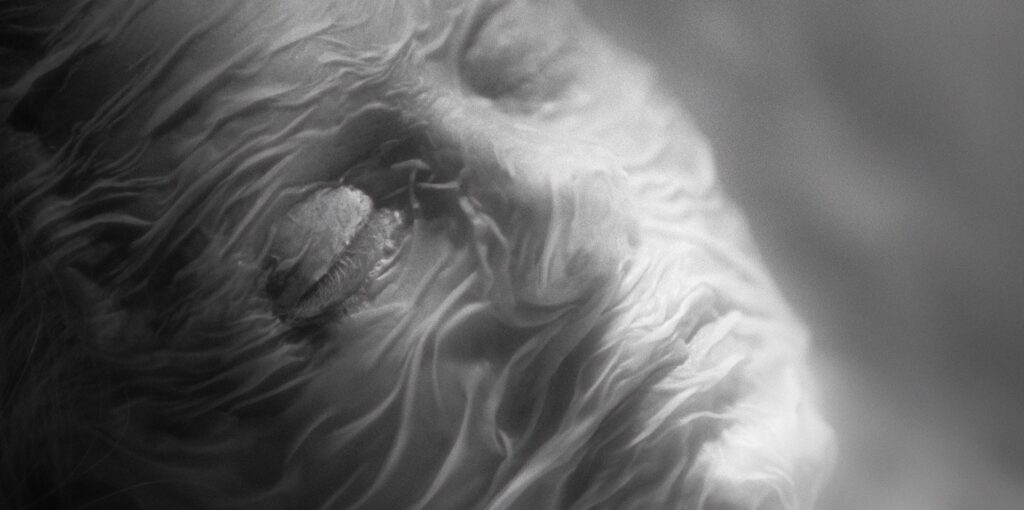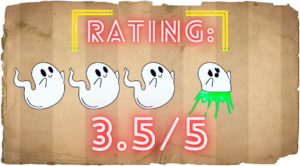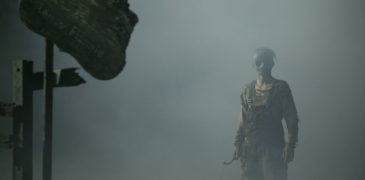
Anx and Cass are on opposite ends of the scale when it comes to personality. Anx is overly cautious while Cass grabs life by the balls and makes the most of every moment. After a night together, the two begin a slightly distant relationship, but when a bizarre pandemic breaks out that causes people to meld into the landscape, the two end up holed up together. As they idle away the days, waiting for information from the outside, the world slowly begins to close in on them as their apartment becomes an inescapable tomb.
What director Thibault Emin was able to accomplish in his first feature film debut, is a testament to low-budget ingenuity. Creating a wholly unique vision of body horror by crafting landscapes and transformations that are unlike anything else committed to celluloid. The merging of the human body into the landscape plays out in terrifying ways, from melting into cement or bed sheets, each transformation is a ghastly spectacle.

Else is Low-Budget Ingenuity at its Best
The way this creeps up on the viewer as well is hard to understate, with the turning point of the couple being attacked marking a visual and thematic departure from the, arguably, comfortable isolation they face. This attack, also presents a unique creature, half man, half stone, whose limited budget to create is buried beneath sharp cinematography, a frantic pace, and the uniqueness of its design. With the movie only amplifying its bizarre creations and blending of environments after this point, the movie becomes a visual spectacle that will impress even the most seasoned cinephile.
Despite their inexperience, actors Matthieu Sampeur and Edith Proust, as Anx and Cass, play into these elements of horror with the conviction of more seasoned performers. This allows audiences to fully immerse themselves in the rather bizarre scenario, as well as become emotionally invested in their troubles. The score, from June Ha and Shida Shahabi, is also a complimentary mix of intrusive and atmospheric noise which ebbs and flows in synch with the movie. The cinematography from Léo Lefèvre can be chaotic, but it is also suiting for hiding the film’s budgetary shortcomings and does an exceptional job of framing both Anx and Cass through their highs and lows.

Else Goes a Little Too Deep
Reading the director notes on the movie, capturing the uncertainty of what happens to the body and mind when it enters the great beyond was crucial in the process. There is certainly a lot of thematic depth to be had here, and Emin explores this with such profundity that is seldom seen in a young, debuting filmmaker. This is particularly true of the degradation of Anx and Cass’s relationship after one of them begins to develop symptoms of the pandemic. In many ways, this sees a shift to a more romantic narrative than body horror, and it is navigated with such grace deserving of a heavy subject like losing a loved one.
However, after the events between Anx and Cass meld away to a grander concept of decay and enter back into ‘the great unknown,’ if you want to put religious context to it will be solely up to viewer interpterion, Else becomes too ambitious for its own good. The movie almost feels like it is separated into three parts, with the latter being too large of a scale to adequately expound on the grand themes that Emin looks to explore. Essentially, the grief and emotions that come with potentially losing a partner are profound enough of a concept to approach, that going beyond that becomes slightly tedious and does a disservice to what came before it.
Else is a perfect film up to a point, wowing with practical effects and offering a deep mediation on suffering through the human condition by evoking images most would equate to the body horror genre. It is clever, and perfectly executed until it is not. Thibault Emin is an immense talent to keep an eye out for, but Else needed a degree of refrain that is lacking with the grand cosmic conclusion it tries to weave; at least the visuals remain stunning throughout the bloated ending.

Else is Screening as Part of this year’s Fantastic Fest 2024

More Film Festival Coverage
Black Mold (2023) Film Review – Break the Mold [FrightFest]
Black Mold is a 2023 American psychological horror film, written and directed by John Pata. The film stars Agnes Albright and Andrew Bailes as two Urbex photographers, Brooke and Tanner,…
Swallowed (2022) Film Review – Don’t Worry, It is Worse Coming Out Than it is Going In
Looking to make some extra cash, Dom is pressured into smuggling drugs over the border. With his friend and aspiring gay porn star Benjamin along for the journey, the night…
Deadware (2021) Film Review – Haunted Point and Click Adventure
Deadware is a 2021 American-found footage horror, written and directed by Isaac Rodriguez. Mostly known for directing horror shorts such as We All Fall Down (2011) and Russian Doll (2019)….
Eyes of Fire (1983) Film Review – Early Stirrings of Folk Horror
The seminal American folk horror film Eyes on Fire has been unavailable on home video for decades. Thankfully, the good people at Severin Films has given the title a 4k…
Hotspring Sharkattack (2024) Film Review – We’re Going to Need a Bigger Onsen! [Nippon Connection 2025]
Hotspring Sharkattack (also known as Onsen shâku) is a 2024 Japanese action comedy film written and directed by Morihito Inoue in his feature debut. There have been cases of mysterious…
Behind the Mask: The Rise of Leslie Vernon (2006) Film Review – Constructing a Slasher
Like all genres, horror owes much of its success to a handful of tropes that can be worked and reworked time and again. Two popular examples are the slasher archetype…

![Black Mold (2023) Film Review – Break the Mold [FrightFest]](https://www.grimoireofhorror.com/wp-content/uploads/2023/08/Black-Mold10-365x180.jpg)



![Hotspring Sharkattack (2024) Film Review – We’re Going to Need a Bigger Onsen! [Nippon Connection 2025]](https://www.grimoireofhorror.com/wp-content/uploads/2025/05/Hotspring-Sharkattack-cover-365x180.jpg)
